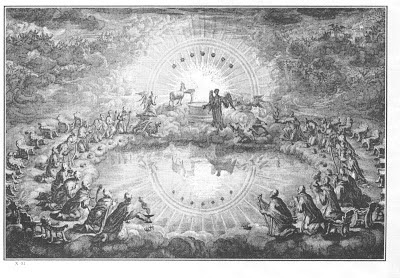TO CHEW ON: "Then I heard a voice from heaven saying to me, 'Write: "Blessed are the dead who die in the Lord from now on."' '"Yes," says the Spirit, "that they may rest from their labours and their works follow them."'" Revelation 14:13
In the midst of the mayhem and chaos of Revelation 14, the thunderous voices and the smoke of everlasting torment comes the reassuring benediction of our focus verse to those who "die in the Lord."
Though death is something we all try to avoid, here the heavenly voice tells John to call them "Blessed."
["The word "blessed" comes from the root "mak" meaning large or of long duration. "It suggests happy, supremely blessed, a condition in which congratulations are in order. It is a grace word that expresses the special joys and satisfaction granted the person who experiences salvation" "Word Wealth," New Spirit Filled Life Bible, p. 1296.]
These dead are blessed for more than just the reason the cynical author of Ecclesiastes gives — because oppressions of life are finally over. Paul in 1 Corinthians 15 lays out in detail why death for the believer is so hope filled. It's because Christ conquered death. Since He rose from the dead, we too can looking forward to resurrection — a life that goes on into eternity (1 Corinthians 15:20-23).
In Revelation 14, the Spirit refers to death as "rest." The time for working is done. But the effects of that work go on.
There are some interesting examples of after-death influence in the Bible:
1. On her death, Dorcas's friends mourn and show Peter her very tangible "work" — the tunics and garments she made (Acts 9:39).
2. Jesus predicted that the act of the woman who poured oil on His head would be retold wherever the gospel was preached (Matthew 26:6-13).
3. Perhaps one of the most curious examples is of after-death influence is the story Elisha's. When a dead man was hurriedly buried in his tomb (the rush because of approaching raiders) on touching Elisha's bones, the man sprang to life (2 Kings 13:21).
4. However, it is clear that our works will follow each one of us to a final day where their quality will be revealed:
"...for the Day will declare it, because it will be revealed by fire; and the fire will test each one's work, of what sort it is..." 1 Corinthians 3:13.
What a challenge to consider carefully how we live, what we live for, and the eternal reverberation potential of the common things on which we spend our time each day!
PRAYER: Dear God, help me to live mindful of how significant are the everyday choices I make. Help me to not to waste time or fritter away opportunities to do lasting work, work that will follow me, in any case, into eternity. Amen.
PSALM TO PRAY: Psalm 45
***************
Unless otherwise noted all Scripture quotations are taken from the New King James Version®. Copyright © 1982 by Thomas Nelson, Inc. Used by permission. All rights reserved.



















